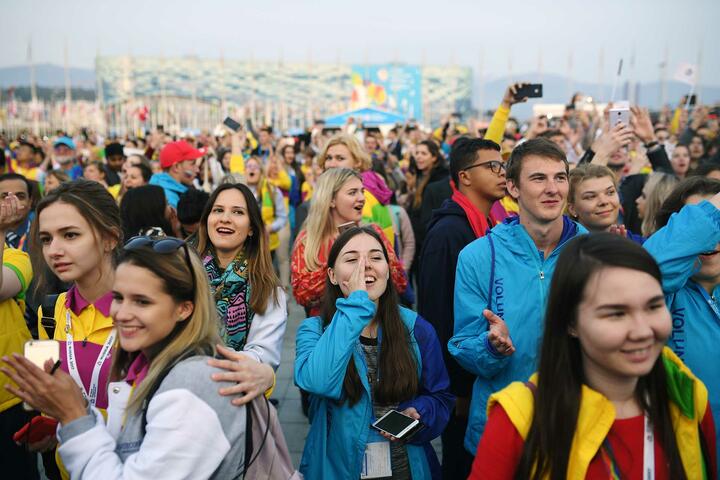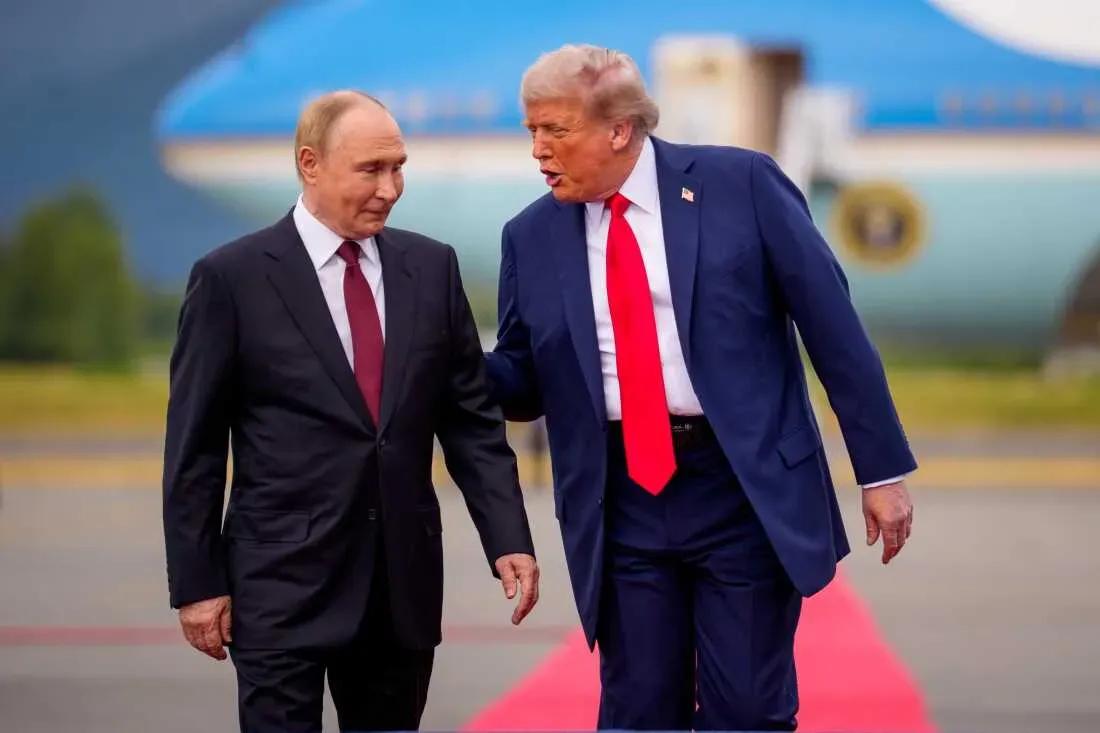Source: NPR
The conflict in Ukraine and its effects on Russian youth.
More than three years have passed since Russia launched its full-scale invasion of Ukraine in February 2022, and the conflict continues with no clear horizon for resolution. What began as a quick attempt by the Kremlin to control strategic territories has turned into a prolonged war that has left thousands dead, millions displaced, and a geopolitical fracture that is redefining the international order.
During this time, peace negotiations have been repeated time and again, but they have almost always remained trapped in a labyrinth of mutual distrust, impossible demands, and conflicting strategies. The precedent of the failed Minsk Protocol, which in 2015 recognized Ukraine’s sovereignty over Donetsk and Luhansk, still weighs heavily on the memory of Kyiv and its European allies, who do not want to sign an agreement that Moscow might disregard in the future.
The recent Alaska Summit, held on U.S. territory, seemed like an unprecedented opportunity to bridge positions. However, instead of moving towards an armistice, it deepened the differences between Donald Trump and Vladimir Putin. The President of the United States is betting on designing a system of international security that protects Ukraine from future invasions, alongside leaders like Emmanuel Macron, Keir Starmer, Giorgia Meloni, and Friedrich Merz. In contrast, the Kremlin chief demands that Volodymyr Zelensky cedes regions occupied by the Russian army as a condition for signing peace, a demand unacceptable to Kyiv and its European partners.
Meanwhile, behind-the-scenes talks between the Pentagon, NATO, and several Western European countries have raised alarms in Moscow. “Discussing security guarantees without Russia is a dead end,” warned Chancellor Sergei Lavrov, confirming the hardening of the Russian position. And in the background, Putin has ordered one of the largest aerial offensives since the start of the war: more than 570 drones and dozens of missiles have struck various Ukrainian cities, in a clear gesture of military pressure on the negotiating table.
Trump, visibly frustrated, publicly encouraged Ukraine to “go on the offensive” to negotiate with Moscow from a position of strength. However, the delay in talks and the rising violence on the ground make the possibility of a direct summit between Putin and Zelensky, initially scheduled for August, shift to September, with no confirmed venue.
In this uncertain climate, marked by diplomatic weariness, military tension, and political impatience, the voices of those who are not part of the negotiation tables but suffer the consequences also resound: ordinary people. Young people who were born under the Russian flag, grew up amidst international sanctions, and today are trying to build an identity in the midst of war. One of them is Irina Antonova, a young Russian political journalist who speaks Spanish and who shares, with the frankness of her generation, how she lives the conflict, what she thinks of Putin and Zelensky, and what future she imagines for her country and for Europe.
In the midst of this international chessboard, where Russian military pressure, the Kremlin’s diplomatic demands, and Western strategies intersect, it is also necessary to listen to those who represent the present and future of Russia: its youth. A generation that, marked by sanctions, propaganda, and digitalization, must learn to navigate in an increasingly closed world towards the West and more open towards Asia.
To understand this perspective firsthand, we spoke with Irina Antonova, a young Russian who speaks Spanish and shares her vision on the war, Moscow's foreign policy, and the challenges her generation faces in a country embroiled in confrontation with Ukraine and at odds with the United States and Europe.
A young person's view on the war and the future of her generation.

Irina Antonova.
From your perspective as a political analyst, how do you interpret Russia's current position in the war with Ukraine?
Today Russia appears confident in its ability to sustain a long war, even in the face of combined pressure from the United States and Europe. What’s interesting is that despite the record sanctions aimed at suffocating its economy, official figures from the IMF show otherwise: a growth of 3.6% in 2023 and around 3% in 2024. This solidity allows the Kremlin to maintain a clear discourse: Western sanctions strategy has not worked.
On the ground, reality also supports that narrative. Moscow has expanded its control in key areas of the Donbas and made advances in Kharkiv, while the military-industrial complex multiplies. The Ministry of Defense claims that ammunition production has nearly doubled in a year, and new plants (like the one in Biysk) are already underway. All of this fuels the confidence with which Putin approaches negotiations: not on the defensive, but as an actor who feels he has room to impose conditions.
And those conditions do not change: neutrality and denuclearization of Ukraine, international recognition of occupied territories, and a gradual lifting of sanctions. In Moscow, a mantra is repeated: the problem is not Russia, but Kyiv’s refusal to accept what they call “the new realities.” In other words, the Kremlin is not just negotiating about Ukraine but about something much more ambitious: the redesign of security in Europe.
What impression do you have of the recent meeting between Donald Trump and Vladimir Putin in Alaska, and how do you think it could affect the conflict's dynamics?
The Alaska meeting was followed with great attention in Russia because it marks the first face-to-face meeting between the two leaders in many years. For the Kremlin, the message is clear: without Russia, serious discussions about global strategic stability cannot happen. That single photo is already interpreted as a diplomatic victory in Moscow.
However, beyond symbolism, the most realistic perspective is to think about a “freezing” of the conflict rather than a definitive peace treaty. Neither Trump nor Putin seems willing to concede enough to seal a comprehensive agreement. Nevertheless, the talks opened a window: expectations have risen that there might be a shift in negotiating dynamics and, at least, a process of de-escalation with U.S. mediation.
What particularities do you see in the way your generation processes and discusses this conflict compared to previous generations?
My generation is, above all, a networked generation. We consume news online at the same level as educational or entertainment content. Some get informed through state media, others follow independent outlets, and many get their news through memes, Telegram threads, or clips on TikTok. This changes everything: the worldview becomes fragmented, less ideological, and much more pragmatic.
Data reflects this well: according to the Russian Public Opinion Research Center, more than half of adults use Telegram daily; among young people aged 18 to 24, that figure rises to 79%, while among those over 55, television remains dominant. The way the war is processed also depends on where you live. Those in border areas or large hubs feel it directly with sirens, drones, and displaced persons. In contrast, in remote areas, it is mediated, almost like background noise that limits travel, mobility, and professional opportunities.
This is another key difference with older generations, who tend to view the conflict as an ideological battle against the West. Young people, on the other hand, compare life in Russia with that of other countries through influencers, friends, and global communities, rather than what official media say.
In what way do you think growing up under Vladimir Putin's leadership conditions the political outlook of young Russians?

More than a political outlook in the strict sense, I think what marks my generation is a value system built from childhood. We grew up listening to the anthem at school, celebrating national holidays like Russia Day or Victory Day, and every December 31, without exception, watching the president's New Year’s message with our family. Those rituals, repeated year after year, forge a strong national and cultural identity.
At the same time, we live in a much more plural digital environment than our parents did. We all know the phenomenon of “echo chambers”: spaces that reinforce opposing views and coexist in parallel. This makes our socialization hybrid: on one side, we receive a patriotic and paternalistic narrative from school, university, or official youth programs; on the other, we navigate a globalized digital space where everything is up for discussion.
The state, moreover, has not remained static: in recent years, it has multiplied support funds, scholarship contests that award up to one million rubles, educational trips, and integration projects. All of this comes with an implicit patriotic message. The result is a generation that normalizes the idea of a strong state, which sees power as a guarantor of security rather than an object of criticism. But at the same time, that same generation is more cosmopolitan than their parents and much more patriotic than those of the 90s. A particular combination that defines how we view politics today.
What impact has the war and international negotiations had on the professional, educational, and international mobility opportunities for your generation?
The landscape is clearly mixed. On one hand, sanctions and visa restrictions have significantly reduced channels for academic and professional exchange with the West. There are no longer direct flights to Europe, we cannot use Russian cards abroad, and the SWIFT blockade has complicated matters even further. For young people, this has meant that even everyday activities (traveling, studying, working abroad) have become a puzzle. In the end, we had to learn alternative mechanisms: from crypto transfers to indirect schemes for paying or moving money. Some countries have resumed granting Schengen visas, but with limitations and reduced quotas.
At the same time, a strong “pivot to the East” has consolidated. Cooperation with ASEAN and BRICS countries expanded, and many educational institutions and businesses started looking directly towards China. A very graphic example: in 2024, the number of schools in Moscow teaching Chinese grew by 123%. Internal mobility towards the East of the country has also increased, and Russia has begun to attract more students from Asia and the Commonwealth of Independent States.
International mobility has not disappeared but changed direction. For my generation, the challenge is to adapt: learn Chinese, open up to Asian markets, and, in many cases, focus on opportunities within the country itself.
If you project into the medium term, what possible scenarios do you see for Russia after this conflict, and what role could your generation play in each?
I see three possible scenarios. The first is the continuation of a prolonged conflict in the same format as today. For young people, this would mean living with limited mobility, adapting to new economic conditions, and focusing on internal projects and markets in Asia. It would be a kind of “stable turbulence”: life goes on, but always under restrictions, forcing us to adjust all the time.
The second scenario would be a freezing of the conflict with international mediation. In that case, some academic and professional channels with the West could reopen, albeit partially. It would not be a full return to normalcy, but rather a narrow window of opportunities that would need to be seized quickly.
The third scenario, the most ambitious…Bitter and today less likely, it is the signing of a comprehensive agreement. This would give youth the possibility to integrate normally into global processes, something that today seems distant but would be crucial for our generation.
In any of these scenarios, young Russians are in a position of transition. We inherit a strong State culture and traditional values, but at the same time, we need flexibility to seek opportunities in any context: whether within Russia, in the opening towards Asian markets, or through global communities.

Comments